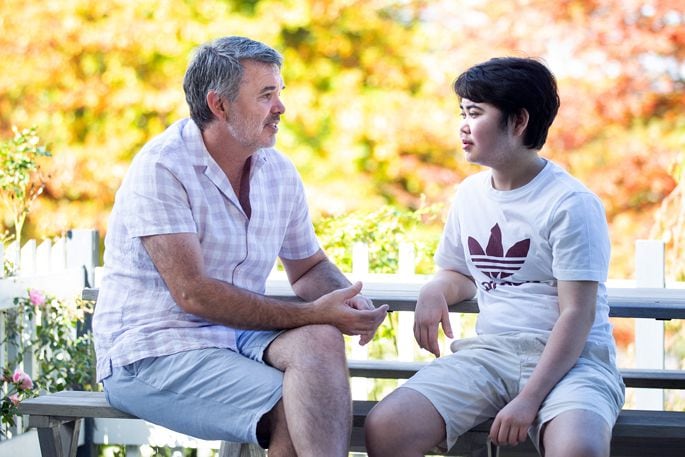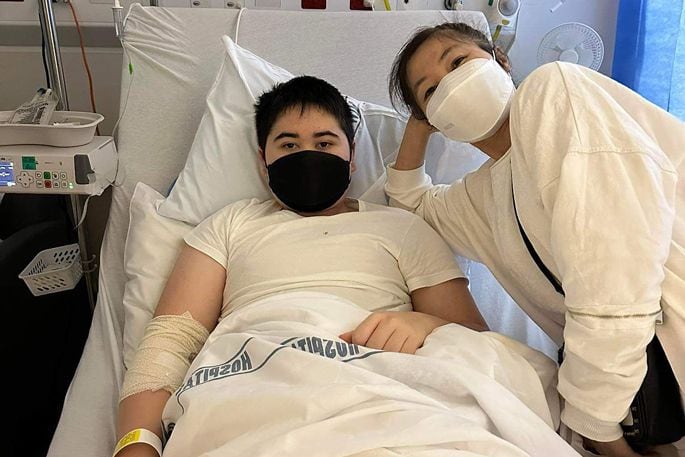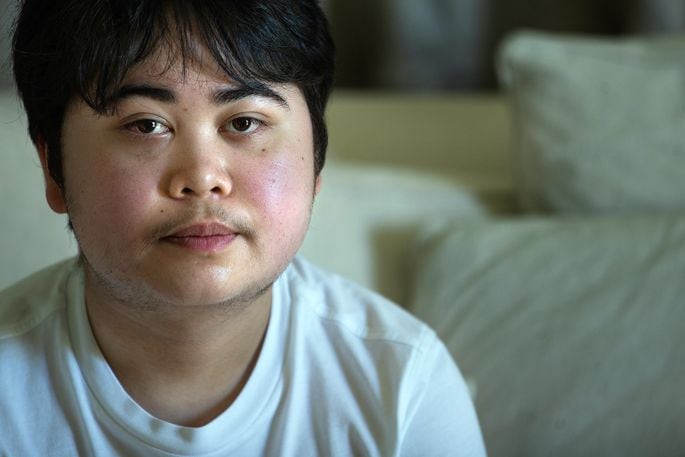Tauranga 16-year-old Daniel Patterson is supposed to be travelling to Italy for a lifesaving bone marrow transplant, instead he is facing challenge after challenge.
In a previous article with The Weekend Sun reporter Georgia Minkhorst, Daniel’s dad, Neil Patterson, explained that Daniel was born with Wiskott-Aldrich-Syndrome (WAS) – a rare genetic immunodeficiency that prevents his immune system from functioning properly.
“This means it’s difficult for Daniel’s bone marrow to produce platelets, making him susceptible to internal bleeding.
“[Doctors] were going to do a bone marrow transplant when he was a baby, but there wasn’t a suitable match,” says Neil. He explains that the risk of the transplant at that stage was also too high.
After experiencing severe stomach problems, ulcerative colitis and intense leg pains and exhausting all options in NZ, Neil and Daniel’s mum, Apple, decided to take him to Thailand.
In Thailand, doctors diagnosed his leg problems as lupus vasculitis.
Neil says Daniel now requires a stem cell transplant before the lupus vasculitis attacks his organs and causes irreparable damage.
Initially, the plan was for Daniel to get a bone marrow transplant in Italy, where they would then be based for six months to a year.
In a video call with Italian specialists in April, they were told Daniel would either have a stem cell transplant using bone marrow from Neil, a suitable donor or by gene therapy using his own bone marrow – the latter still being under trial.
The cost of the transplant will be more than €300,000, plus outpatient medication – about $541,000.
This huge financial undertaking meant that Apple and Neil re-mortgaged their house. “We’ll sell one of our cars, and Apple’s borrowed money from the family, then we’ll use some of our saving but that’s just some of the costs.”
A GiveaLittle page has been running since April 4 and will end on October 4, 2024. The fundraising goal is set for $250,000 and they have raised $8560 so far.

Daniel with his dad, Neil.
Gene Therapy
Recently, the family has learnt more about the treatment called Gene Therapy. “The standard bone marrow transplants mean using a donor and the only suitable one is me, which is not a compete match; it is HAPLO,” says Neil.
“This type of transplant is risky for his age and not having a compete match.
“Gene Therapy uses his own bone marrow which means no graft v host disease and lower dose of chemotherapy.”
Neil says Gene Therapy may not completely fix all his problems, but results have been good so far and the specialists from Germany and Italy recommend this as a very good option.
“If it doesn’t work, he can still do the normal transplant, but if he did the normal transplant first and it doesn’t work, nothing else can be done.
Funding declined
“We asked the immunologist at Starship to apply to the High-Cost Pool for funding. It is incredibly expensive, but we have to try.
“For the past six weeks, doctors in Italy and New Zealand have been in communication.”
Neil says Starship submitted the application a couple of weeks ago and it was declined a few days later. “We are incredibly disappointed.”
In an email by Daniel’s specialists in Italy, Dr Alessandro Aiuti and Dr Francesca Ferrua, they say that they have been made aware of the funding being declined are disappointed.
“We really hope to find an alternative way for gene therapy,” says one of the specialists.
“We are still going to do the transplant in Italy whether it be Gene Therapy or a normal transplant,” says Neil. “All doctors agree that it should happen this year.”

Daniel Patterson and his mum Apple Patterson in hospital in Tauranga. Photo / Supplied.
Another roadblock
However, there is still one barrier preventing Daniel from getting this life-saving treatment, his wisdom teeth.
“We just found out a while ago that Daniel has impacted wisdom teeth, so they must be removed to prevent any infection during transplant.
“Daniel has to have his wisdom teeth removed plus the molars next to them so eight teeth.”
Neil explains that the Italian specialist contacted Daniel’s haematologist with a plan on how best to do this because he will need a platelets transfusion – too many transfusions are not good before a transplant – and other methods to prevent bleeding.
Yet another roadblock
“Daniel has low platelets so bleeding a serious problem. The haematologist referred it to a dental surgeon in Tauranga who we met on July 11 and said to put it through as urgent and it would be done by mid-August.
“We were contacted a few days later by the Tauranga hospital for pre-admission.
“Two weeks later we had heard no more so I made many inquiries about what was happening, but no one knew anything.
“Eventually I saw a letter that was sent to our GP dated July 11 saying the haematologist had changed her mind and now wants it done in Waikato.”
Neil says Daniel is back on the waiting list with no idea of when it may happen.
“The most annoying thing is, as of last Friday Waikato still hadn’t received the referral yet.
“It is so incredibly frustrating; the communication is hopeless. I even got an email from Dr Ferrua asking if there was anyone she could contact to speed it up.
“We have had nothing but problems trying deal with NZ Healthcare.”
Response from NZ Healthcare
“We acknowledge how challenging it can be for patients and whānau to negotiate different parts of the healthcare system and we do our best to help them through this where we can,” says Health New Zealand | Te Whatu Ora, National Clinical Director Primary & Community Care, Commissioning Sarah Clarke.
“A rare disorder by definition affects very few people. Because of their rarity, these disorders are often not easy to diagnose or to treat, especially where they are complex in nature, or associated with other related conditions.
“It’s important to improve the health system’s ability to provide appropriate care for these patients and their whānau. In total, there may be as many as 300,000 New Zealanders living with a rare disorder.
“In recognition of the challenges posed by rare disorders, the Ministry of Health recently published New Zealand’s first ever Aotearoa New Zealand Rare Disorders Strategy.
“This strategy sets out the direction for the health system to better support people and their whānau living with rare disorders.
“It provides a framework and long-term priorities that will guide health entities in improving health and wellbeing outcomes for people and their whānau with rare disorders over the decade 2024 to 2034.
“Health New Zealand | Te Whatu Ora looks forward to contributing to the strategy’s implementation over time, within available resources.”
To help support Daniel so that he can get life-saving treatment visit: givealittle.co.nz/cause/stem-cell-transplant-needed



0 comments
Leave a Comment
You must be logged in to make a comment.